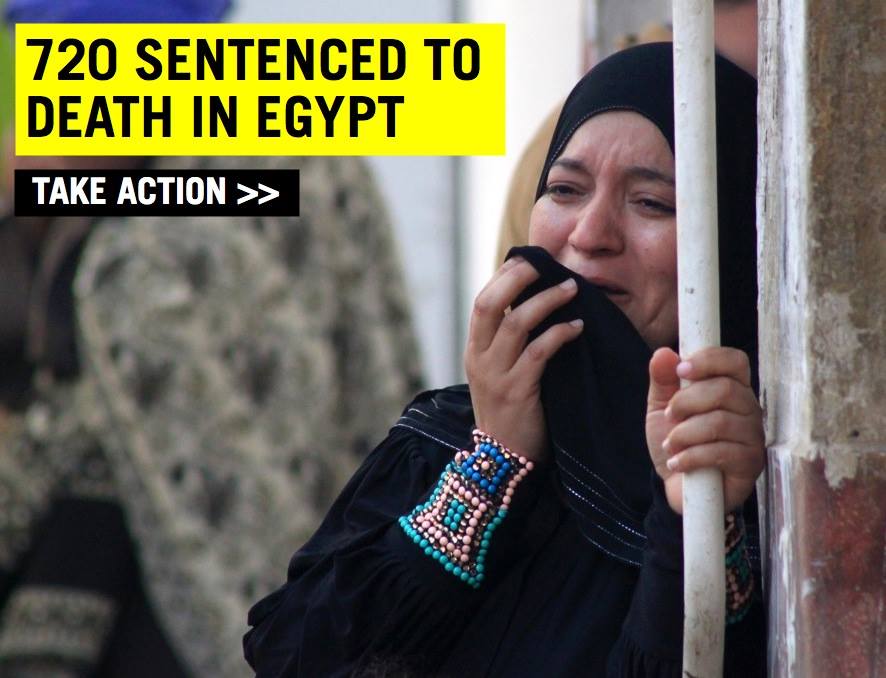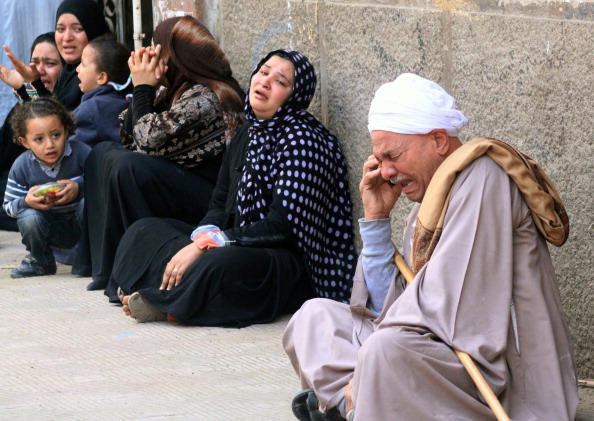
There’s a new hanging judge in Egypt, and he’s casting a chill upon the declining hopes and vision for human rights that came out of the 2011 uprising.
It’s been one month since the judge sentenced 528 people – alleged supporters of former Egyptian president Mohamed Morsi – to death. On Monday, the judge returned to the case, confirmed 37 death sentences and gave the remaining 491 people life in prison.
At the same time, he sentenced 683 more people to death in a trial that news reports stated lasted just minutes. Both cases have to do with deaths of Egyptian policemen during violence that arose in August 2013 following Morsi’s removal from office.
The two cases stand as a mockery of justice, death sentences issued on an industrial scale. The size of the injustice is raising outrage around the world, but beneath the headlines, there are important human rights messages to be learned.
Here are five things you may be missing about Egypt’s judicial crisis.

Egyptian relatives of supporters of ousted Islamist president Mohamed Morsi cry sitting outside the courthouse after the court ordered the execution of hundreds of Morsi supporters after only two hearings in March (Photo Credit: AFP/Getty Images).
1. The Egyptian judiciary hasn’t always been thought of as the government’s lapdog. Even during the most repressive days of the Mubarak regime, elements of the Egyptian judiciary stood strong as an independent power. In fact, enough judges and lawyers caused problems for the government that to go around the judiciary it developed a system of state security and emergency courts to try civilians in violation of international legal standards.
2. The crackdown is wider than the Muslim Brotherhood. While attention has focused on the two mass death sentences of alleged Muslim Brother supporters, the government is using its full powers to harass and silence journalists and political opposition with many different perspectives.
The youthful veterans of the social media-powered Tahrir Square protests in 2011 are on the run as well. In the aftermath of Morsi’s removal, dozens of young activists have been arrested. Those targeted also include members of women’s groups, an organization protesting the continued use of military courts to try civilians, and the “January 25 Revolution” group, which helped lead the anti-Mubarak uprisings.
On Monday, the same day as the announcement of the 683 death sentences, an Egyptian judge banned the anti-Mubarak April 6 movement.
3. The United States government is not a bystander. The death sentences are an embarrassment to the Obama Administration, which just last week gave approval for the sale of Apache military helicopters, the same kind that Amnesty International documented the use of in Egyptian military surveillance of protesters in August 2013.
Following those assaults, the U.S. stated it had initiated a partial suspension of arms sales to Egypt. That sales were reinstated amid a human rights catastrophe in Egypt makes it clear that, once again in the Middle East, the United States government is willing to sacrifice human rights.
4. The trials may be hiding other abuses. Amnesty International opposes the death penalty in all cases, but in Egypt, the sentences often carry an extra nasty touch. Traditionally death sentences are tied to a range of other human rights abuses, most notably torture, prolonged administrative or incognito detention and unfair trials.
5. This is not the end of the Egyptian uprising. The mood of the activists in Egypt is somber, but they haven’t given up.
Egyptian activists only need to look nearby in the region, toward Tunisia, to see a case in which the 2011 uprising appeared to be headed to chaos just a year ago following two high-profile political assassinations. Now a national unity government is building upon a new constitution that may herald a new era for human rights. Even in this dark time, a different road for Egypt still remains possible.
Thank you for this helpful reflection.
the western governments play a key role in these violations. They fear an Islamist gov to rule so they back the military ruling authorities as a substitute. thus ignoring the will of the majority of the Egyptian people. give the people their chance to rule. Islamists are not terrorists, rather they have their own vision to rule in a democratic way and they seek peace.
They trials are hiding other abuses. Egyptian prisons have long been known for the abuses to prisoners political and otherwise but especially political.
Forgive my overcynical nature, I appreciate the humanity of nonEgyptians in realising that each and every human on this planet has a right; I appreciate what you are doing but how is a letter to the minister of justice of the Egyptian coup and the ambassador of Egypt going to help? The Muslim Brotherhood have been hated by the military governments of Egypt ever since they stood in protest against Nasser for his ousting of Mohamed Naguib, Egypts first president. A man with a vision a man who desired democracy and equal rights for Egyptians much as Dr. Morsy did. The thing is in their total lack of concern for the people -except to deal with them as so many serfs that work to wield the millions for the elite they have failed to grasp that those who help the people are loved by thhe people and however many media channels are shut down, and however many media channels spew lies and distorted facts the majority of people love the Muslim Brotherhood for their selflessness and charities. If a parliament were formed and theMB were allowed into the elections the people would vote for them again, if a presidency election came up and Dr. Morsy was allowed out of his glass cell, people would vote for him again.
THis execution is in the way of a smothering, trying to smother the voices much a Nasser did in the hopes that people would be too scared to utter a word.
Frankly, I want to vote, I want to write my name and scream at the top of my lungs at the coup to stop killing our children and our pregnant women and our engineers and doctors and university professors. I want to say enough killing, but I need to know that I as an Egyptian can actually be able to go back home because the secret service inEgypt are no joke and men and women are black listed in much the same way as the jews were in Eastern Germany at the time of the holocaust, in much the same way as the puritans were dragged and beaten in the middle ages, its no joke and trying to convince a heartless coup to be less heartless is not going to do anything, Your last point is true, the revolution continues, I suspect we are all bracing ourselves for the revolution of starvation which the coup has ignited and I suspect this battle of wills will be won with the ones with the longest breath and that is the Egyptian people who have tasted one meagre year of a baby democracy and are determined to get their dignity and human rights back